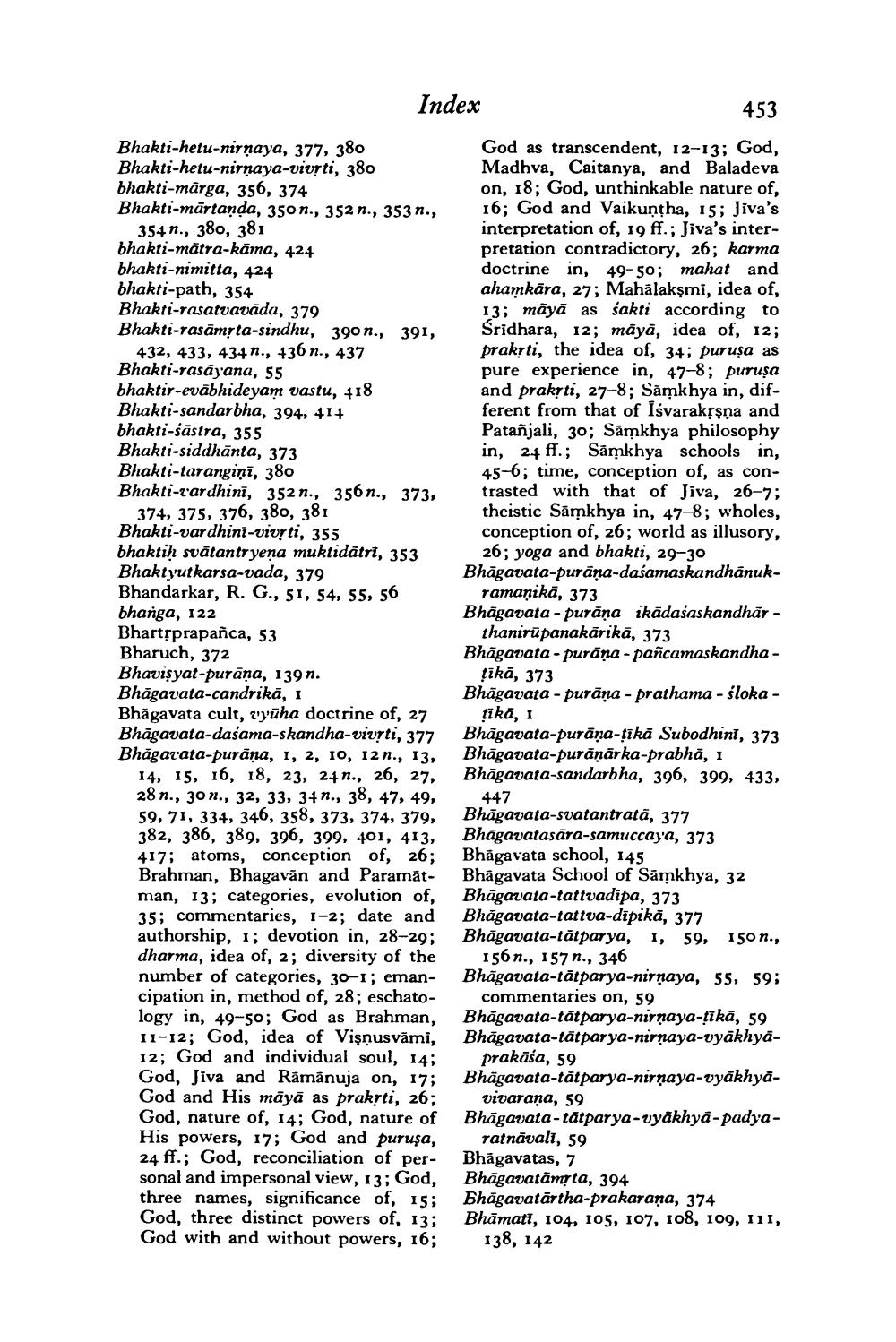________________
Index
453
Bhakti-hetu-nirnaya, 377, 380 Bhakti-hetu-nirnaya-vivīti, 380 bhakti-mārga, 356, 374 Bhakti-mārtanda, 350 n., 352 n., 353 n.,
354n., 380, 381 bhakti-matra-kāma, 424 bhakti-nimitta, 424 bhakti-path, 354 Bhakti-rasatvavāda, 379 Bhakti-rasämsta-sindhu, 390 n., 391,
432, 433, 434n., +36 n., 437 Bhakti-rasāyana, 55 bhaktir-evābhideyam vastu, 418 Bhakti-sandarbha, 394, 414 bhakti-śāstra, 355 Bhakti-siddhānta, 373 Bhakti-tarangiņi, 380 Bhakti-rardhini, 352n., 356 n., 373,
374, 375, 376, 380, 381 Bhakti-vardhini-vivrti, 355 bhaktih svātantryeņa muktidātri, 353 Bhaktyutkarsa-vada, 379 Bhandarkar, R. G., 51, 54, 55, 56 bhanga, 122 Bhartsprapanca, 53 Bharuch, 372 Bhavisyat-purāna, 139 n. Bhagavata-candrikā, i Bhăgavata cult, zvyūha doctrine of, 27 Bhāgavata-dasama-skandha-vivrti, 377 Bhāgatata-purāna, 1, 2, 10, 12n., 13,
14, 15, 16, 18, 23, 24 n., 26, 27, 28 n., 30 n., 32, 33, 34n., 38, 47, 49, 59, 71, 334, 346, 358, 373, 374, 379, 382, 386, 389, 396, 399, 401, 413, 417; atoms, conception of, 26; Brahman, Bhagavān and Paramātman, 13; categories, evolution of, 35; commentaries, 1-2; date and authorship, I; devotion in, 28-29; dharma, idea of, 2; diversity of the number of categories, 30-1; eman- cipation in, method of, 28; eschatology in, 49-50; God as Brahman, 11-12; God, idea of Vişnusvāmi, 12; God and individual soul, 14; God, Jiva and Rāmānuja on, 17; God and His māyā as prakrti, 26; God, nature of, 14; God, nature of His powers, 17; God and puruşa, 24 ff.; God, reconciliation of personal and impersonal view, 13; God, three names, significance of, 15; God, three distinct powers of, 13; God with and without powers, 16;
God as transcendent, 12-13; God, Madhva, Caitanya, and Baladeva on, 18; God, unthinkable nature of, 16; God and Vaikuntha, 15; Jiva's interpretation of, 19 ff.; Jiva's interpretation contradictory, 26; karma doctrine in, 49-50; mahat and ahamkāra, 27; Mahālakṣmi, idea of, 13; māyā as sakti according to Sridhara, 12; māyā, idea of, 12; prakrti, the idea of, 34; puruşa as pure experience in, 47-8; puruşa and praksti, 27-8; Samkhya in, different from that of Isvarakrsna and Patañjali, 30; Samkhya philosophy in, 24 ff.; Sámkhya schools in, 45-6; time, conception of, as contrasted with that of Jiva, 26–7; theistic Sâmkhya in, 47-8; wholes, conception of, 26; world as illusory,
26; yoga and bhakti, 29-30 Bhāgavata-purāna-daśamaskandhānuk
Tamaņikā, 373 Bhāgavata - purāņa ikādaśaskandhār -
thanirūpanakārikā, 373 Bhāgavata - purāna - pañcamaskandha -
tikā, 373 Bhāgavata - purāna - prathama - śloka -
tikā, I Bhāgavata-purāņa-tīkā Subodhini, 373 Bhāgavata-purāņārka-prabhā, i Bhāgavata-sandarbha, 396, 399, 433,
447 Bhāgavata-svatantratā, 377 Bhāgavatasara-samuccaya, 373 Bhagavata school, 145 Bhagavata School of Samkhya, 32 Bhāgavata-tattvadīpa, 373 Bhagavata-tattva-dipikā, 377 Bhagavata-tātparya, I, 59, 150 n.,
156 n., 157n., 346 Bhagavata-tātparya-nirnaya, 55, 59;
commentaries on, 59 Bhagavata-tåtparya-nirnaya-țīkā, 59 Bhăgavata-tātparya-nirnaya-vyakhya
prakāśa, 59 Bhāgavata-tātparya-nirnaya-vyākhyā
vivarana, 59 Bhāgavata-tātparya-vyakhya-padya
ratnāvali, 59 Bhagavatas, 7 Bhāgavatāmita, 394 Bhāgavatārtha-prakarana, 374 Bhāmati, 104, 105, 107, 108, 109, III,
138, 142




